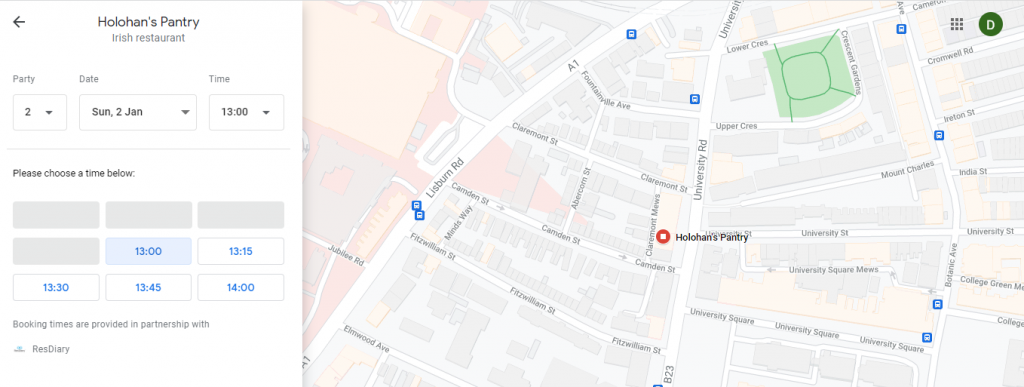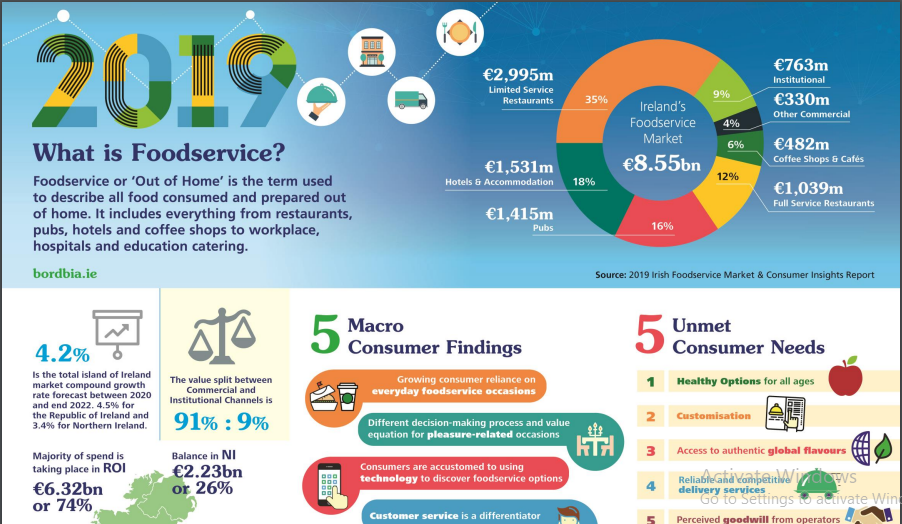Final Pitch Idea

Somewhere Different – A complete table reservation service that offers discounted dining during the quieter hours of cafes/restaurants across Ireland. Key features include :
- discounted rates of a minimum of 35% off all food for the duration of that booking (excluding alcohol)
- seeks to fill gaps prior to peak times whilst encouraging reviews
- an incentive for both the customer and the business
- customer can order/pay/split bill/leave tips/review/upload photos through the app
- will include all cafes in Northern/Southern Ireland
- boost off the back of the ‘eating out to help out’ scheme
- takes the hassle out of thinking of somewhere to eat by suggesting places nearby as well as those with discounted tables left
- used to book a table at any time, not just discounted tables
- restaurants/cafes/hotel dining booking
- eat places you wouldn’t usually eat for a smaller cost
How I came up with the concept/name
If there is one thing I am passionate about, it’s food and travel. Whilst on a quick visit to London I wanted to find a table quite late in the evening in a place I wasn’t familiar with. I went to trusty Google maps because they list all the restaurants and opening times, phone numbers, etc. sometimes they even let you book via the app ( I love this!). However, it was very limited to what I could book and a lot was already full or at a set time that didn’t work for me. This meant I would have to ring them one by one and ask whether a table was free, which is not ideal when you are in a noisy pub in London. Then I had that eureka moment that came from the inspiration method to generating ideas, spoken about in my previous blog…and then Somewhere Different was born. Named after my response every time I am asked where I want to go to eat…
Traveling is such a big part of my life and with that comes eating my way across the world ( as good a dream as any to have), but there is a lack of digital products in which you can reserve a table no matter where you are, never mind one that offers discounts. Reserving a table on Google Maps is ok but it is not primarily what maps do, and not all restaurants are signed up to the service. You can ring around restaurants, but does anyone even make a phone call anymore? There is a gap for an extremely accessible dining reservation experience. What I want to propose is a Google maps but solely for tables, except some of those tables offer fantastic savings. During the pandemic, the ‘eat out to help out’ scheme (article on the scheme) proved extremely popular and emphasised what a vital role the hospitality sector has on our local economy. I plan to take a little inspiration from that scheme and pair it with a gap in the market and a dash good user experience to pitch the concept of ‘Somewhere Different’. I want to put the restaurant in control as well as the consumer, satisfying a need of both parts ( for a small fee of course ). Just Eat, Deliveroo and Uber Eats are just a few services that have thrived during Covid, proving that enhancing eating experiences make money. Well, now it’s time that experience benefited the customer as well as the business owner because it’s the two-way street that keeps one dependant on the other.
Competitors/similar services
Google Maps
With Google maps you can pretty much search anywhere you want to eat (provided they have registered up to a Google Business account and input their business address). However, not all places are signed up to make a reservation on the app/browser. Cafes are very rarely offering a reservation service, but could greatly benefit from a service like I am proposing during quiet times. After all discounted tables that are full are better than no tables at all, especially during harder times such as the new year. Googles’ booking system is, however, very easy. Click and it’s done, and just as easy to cancel.


Based in San Franciso. Worldwide company and has services in Northern Ireland e.g Derry, Belfast. It boasts 538 restaurants in N.Ireland, which may seem a lot but it isn’t. In fact, it only has 9 restaurants/cafes for Derry. It completely misses out on the south of Ireland too. If I look at the Belfast area, however, it only states 92 establishments. A few cafes are available but there is such a vast amount of business potential not signed up to the service. Something an international brand may be missing out on as they may not see the potential in the area or know the local area well enough to convince them to sign up for the benefits? I like that Open Table offers a delivery service, allowing for competition with other delivery services. However, I do not want to compete with delivery services, maybe even sell advertising space to them. My niche would be to benefit the business and the customer, enhancing the relationship between the two.
Research, Research, Research
I read this article on the effect covid may have on businesses –‘ Noel McAdam-February 07 2021 09:22 AM
If a third of northern Irelands restaurants is 150 then there are an estimated 450 restaurants (not cafes/other categorized eating establishments) in the North (only not the south).
A fifth of hotels is 30, then 100% is 150 hotels (northern Ireland only)

This is how I calculated some of my figures when calculating estimated profit.
If we look at the popular visit Belfast site as a model for restaurant booking they offer a good directory as well as restaurant/cafe information. It offers a small but good overview of the eating establishment as well as high-quality photos and all the information a customer could need. With direct links to the site, google maps, social media, and their booking system ( if they have one). However, there are only 51 establishments listed and I want them ALL!
‘This statistic shows the total value of the eating out market in the UK from 2008 to 2018. Expenditure is presented annually, with 2018 showing an increase in sales compared to 2008. In 2018 the market valued 89.5 billion British pounds.’
this blog offered so many statistics on the dining state of the UK before and now. A few interesting statistics were:
- Over the course of the pandemic, the restaurant and hospitality industry adapted well to the changing rules, as the proportion of temporarily closing businesses plummeted from 81% in the 2020 lockdown to just 54% in the 2021 lockdown.
- There are 42,070 full-service operating restaurants within the UK.
- The restaurant industry turnover of 2021 (so far) is still 25% lower than that of 2019.
- The turnover in May 2021 is five and a half times higher than it was in May 2020.
- Restaurant bookings in May 2021 (just after restrictions lifted) soared up to 32% higher than the pre-pandemic May 2019.
- After the lockdown softened in July 2020, UK restaurants were much slower to recover than pubs, with 36% vs. 94% reopening respectively.
- The trading conditions of total restaurant sales in the UK dropped by 64.9% in 2020.
- The Bank of England claims that UK households potentially saved £100 billion in consumer costs over the course of the pandemic, implying there could be a massive surge of interest in restaurant activities once all restrictions are lifted.
- The UK government’s Eat Out to Help Out plan successfully brought pubs, bars, and restaurant groups back to their 2019 levels.
- In 2021, the UK restaurant sector is expected to rise by 32.1%, or £11.7 billion, respectively.
- During 2020, the use of QR (Quick Response) codes became far more filtered into the mainstream restaurant market. Presently, over 84% of UK citizens have used a QR code to pay for a meal, establishing their presence as a staple in restaurant payment options.
- In 2020, as much as 48% of UK citizens are willing to exchange their data for more personalised services and options within the restaurant industry.
- Contactless payments made up 27% of the total payments made within the UK during 2020, the demand for cashless or contactless payments continues to grow.
- During 2020, the number of cash payments made fell by 35% overall.
- 40% of restaurant consumers report that they are comfortable dining out regardless of contactless payment options, but 56% of restaurant consumers say that such options are of importance to them.
- Almost two-thirds of UK consumers say that they would rather dine out at restaurants with contactless or QR code payment options than those without.
- Up to 90% of consumers in the UK will research a restaurant before visiting – more than any other business type does.
- The global online food and restaurant industry cropped up £25 851 060 000,00 in profits during 2020, emphasising the importance of functional and user-friendly online delivery options.
Here are some facts and figures I found on Ireland/Northern Irelands food and drink sector :


- Pubs account for 17% of Commercial foodservice spend (excluding alcohol).
The fastest-growing segment in the Commercial space is Coffee Shops (up 5.9% in ROI and 5.3% in stg£ in
Northern Ireland) and Hotels (up 6.2%in ROI and 5.4% in stg£ in NI).
According to a blog 4years, ago (figures may have changed due to covid or risen with growth in demand) ‘Ireland may be a small country but it is home to an awful lot of pubs. It’s home to 7,193 of them, in fact, as well as 3,161 off-licenses, 2,406 restaurants, and 983 hotels, according to a new report by the Drinks Industry Group of Ireland (DIGI), which was authored by DCU Economist Anthony Foley.’
The report, which was released last month, measures a five-year period and shows that specialist coffee and tea shops have grown from 210 units in 2013 to 328 in 2018. There are also 133 more cafes on the scene too, taking the total to 1,645.
figures for hospitality sector in the north
‘• With an annual turnover of c£2bn and sustaining c65,000 jobs,
the NI hospitality industry is a significant economic sector in its
own right.
• It is also the backbone of the growing tourism economy,
accounting for c60% of tourism spend (c£600m) and providing
three out of four tourism jobs. ‘
All this research will make complete sense in my pitch…